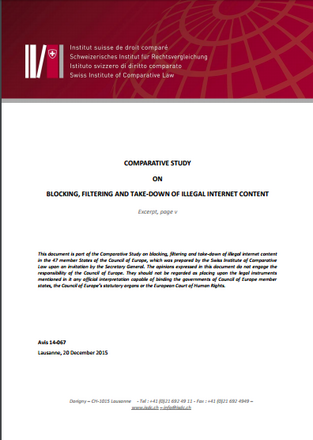
Filtering, blocking and take-down of illegal content on the Internet
The Council of Europe commissioned to the Swiss Institute of Comparative Law (SICL) a comparative study about filtering, blocking and take-down of illegal content on the Internet in the 47 Member States of the Organisation. This study describes and assesses the legal framework, but also the relevant case-law and practice in the field.
The analysis consists, essentially, of two main parts. The first part represents a compilation of country reports for each of the Council of Europe Member States. It presents a more detailed analysis of the laws and practices in respect of filtering, blocking and takedown of illegal content on the internet in each Member State.
The second part contains comparative considerations on the laws and practices in the Member States in respect of filtering, blocking and takedown of illegal online content. The purpose is to identify and to attempt to explain possible convergences and divergences between Member States’ approaches to the issues included in the scope of the study.
Blocking, filtering and takedown of illegal internet content have some consequences for the freedom of expression. This study shows the difference between blockage and censorship, especially in some fields as Protection of intellectual property rights, Protection of reputation and personal data, Protection of public morals or health, online gambling, terrorism, criminality (in particular, hate crimes) and national security.
The present study was developed in three main stages. In the first, preliminary phase, the SICL formulated a detailed questionnaire, in cooperation with the Council of Europe. After approval by the Council of Europe, this questionnaire (which is included in the study) represented the basis for the country reports. The second phase consisted of the production of country reports for each Member State of the Council of Europe. Country reports were drafted using academic writings and, in some cases, depending on the situation, interviews were conducted with stakeholders in order to get a clearer picture of the situation. However, the reports are not based on empirical and statistical data, as their main aim consists of an analysis of the legal framework in place. Finally the study shows a compilation of country reports for each of the Council of Europe Member States written by independent experts familiar with the legislation of the country.
Tags: Media Law Censorship Privacy Copyright Council of Europe Member States Hate speechThe content of this article can be used according to the terms of Creative Commons: Attribution-NonCommercial 4.0 International (CC BY-NC 4.0) . To do so use the the wording "this article was originally published on the Resource Centre on Media Freedom in Europe" including a direct active link to the original article page.

